Blog posts tagged tablet
Microsoft's 'proper' Windows tablet is here. Almost.

A few months ago we took a good look at the Microsoft Surface RT. This tablet computer from Microsoft is nicely built and well-rounded, but it has one glaring problem.
Although it runs a version of Windows called Windows RT, it can only run special Windows RT apps, and not your standard Windows software.
Buy a Surface ProMicrosoft Surface should be available direct from Microsoft from 23 May. The entry-level model will cost £719, and you can add a touch cover (with keyboard) for an extra £80. |
On the basis that a key reason to buy a Windows tablet is to run traditional Windows software, we reckoned most businesses would want to wait until the Surface Pro was released.
(If you do want a Windows RT tablet, Dell's XPS 10 is cheaper in any case.)
The Surface Pro is a more powerful model that does have a 'proper' version of Windows on it. This means it can run all your standard Windows software.
It's been available in the US since February, but Microsoft has finally announced it'll be available this side of the Atlantic from Thursday.
Surface Pro is your computer
Surface is a big bet for Microsoft. So far the software giant has struggled to make inroads into a tablet market dominated by Apple and Google, and it hopes this device will change that.
And maybe, just maybe it will. Initial reviews are reasonably positive.
Microsoft has done something genuinely different, building what's effectively a fully-functional Windows PC into a device that works like a tablet. While you'd struggle to use an iPad or Android tablet as your only business computer, Surface Pro can do the job pretty well.
That's because it's built from similar components as many of the super-light, super-thin ultrabook laptops on the market. The only difference is that Microsoft has crammed those components into a tablet device with an optional detachable keyboard.
Plug in a mouse, keyboard and external screen and you can quite happily use it as your main computer while you're in the office. But disconnect it and it's good to slip in your bag - even if it is a good bit thicker and heavier than other tablets of this size.
Available this week
And I think that's where the Surface Pro sits in the market. With prices starting at £719 (plus another £100 or so for the keyboard), Surface Pro isn't really a direct competitor to Apple's iPad, which starts at £399.
But if you're in the market for a thin, light laptop, maybe you'd consider opting for the added tablety flexibility of a Surface Pro instead. PC Pro and the Daily Telegraph both have in-depth reviews to help you decide.
Dell XPS 10 review: a great business tablet with one Achilles' heel
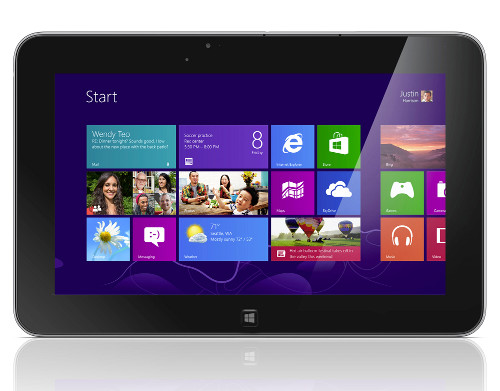
Light and slender, Dell's XPS 10 tablet computer looks like a small laptop, except the optional keyboard (not pictured) can be removed, transforming it into a pure 10.1" touch screen tablet.
We spent a couple of days using the XPS 10. Here are our first impressions.
Solid and weighty
Buying the XPS 10The XPS 10 is available direct from Dell. There are several models to choose from. Prices start from £299 for the entry-level model with 32GB of storage and no keyboard. The top-end model is £444, including the keyboard. See options and buy online >> |
The XPS 10 is an attractive, understated piece of kit. It feels solid and - when you choose to use it - the keyboard is pleasant and quiet, if a little undersized.
It would be nice if the keyboard had a backlight, but the large trackpad works nicely without feeling at all cramped.
Because the keyboard contains extra batteries, when you use the XPS 10 in its 'laptop' configuration, the battery life is fantastic. It'll keep going for 16+ hours, which is great if you're on a long flight or simply don't want to recharge so often.
However, the flipside of this staying power is the significant weight of the keyboard. In pure tablet mode, the Dell XPS 10 weighs in at 635g, which is slightly less than an iPad. But adding the keyboard more than doubles this to 1.3kg.
A well-connected tablet
The XPS 10 impresses with its connectivity too. The screen includes a micro-USB port and micro-SD memory card slot, as well as the dock connector for the keyboard. When the keyboard isn't attached, this doubles as an HDMI output via an adaptor, allowing you to connect an external screen when in tablet mode.
There are extra ports on the keyboard, including two USB connections and a mini-HDMI port, for hooking up screens and projectors.
The touch screen is clear and bright - even in sunlight - and allows multi-touch gestures just like a decent tablet should. It responds well when you tap and swipe, comparing favourably with other tablets in this bracket.
Adequate storage, good performance
The XPS 10 includes either 32GB or 64GB (gigabytes) of storage space. That's not a huge amount, particularly when you realise the pre-loaded software can leave as little as 16GB of usable space on the smaller-capacity model.
It is still room for lots of text documents or thousands of images. However, it would be wise to avoid downloading large video or music files, as these could eat up that space quickly.
Overall, the XPS 10's performance certainly feels snappy. Chuck in the enormous battery life and this Dell tablet starts to look like a real winner.
Is Windows RT enough?
The XPS 10's Achilles' heel is that it comes with Microsoft Windows RT, a special version of Windows designed for tablets.
The problem with Windows RT is that it can't run most standard Windows software. That means some of the programs you use in your business are unlikely to work on the XPS 10.
The tablet does come with a web browser, email software and other tools which mean it's fine for browsing the internet and using many cloud services. There's also an app store where you can download apps that will work on the tablet, although it's sparsely populated compared with competing app stores from Apple and Android.
Most usefully, the XPS 10 includes a special version of Microsoft Office, meaning you can work on Word, Excel and PowerPoint documents.
However, when you buy the tablet you'll get the Home & Student Edition of Office, which is not licensed by Microsoft for commercial use. As ZDNet has revealed, you'll need to buy an additional commercial license to legally use this version of Office in your business.
It's worth noting this isn't really Dell's fault. Microsoft hasn't made other versions of Office available with Windows RT. But it still seems bizarre that a tablet specifically marketed as being 'great for work and play' comes with key software that you can't legally use for work.
Our conclusionThe Dell XPS 10 is a nicely-built tablet with a brilliant battery life. It has few weak points when used in either tablet or laptop modes, and during our limited time with it we've been impressed. But whether it's right for you will probably come down to whether you can manage with Windows RT. It's confusing to use a version of Windows that doesn't run your existing software and the limited-but-expanding range of apps could be a source of frustration. (In fact, one of Dell's competitors, Samsung, has cancelled its Windows RT tablets.) As a tablet for internet and email then the XPS 10 is an excellent piece of kit. If you're happy to pony up for a commercial Microsoft Office license and the other apps you need are available for Windows RT then it could be a great addition to your business. Just make sure you're comfortable with the software's limitations before you make the leap. Get more details and buy online from Dell >> |
What does 2013 hold for mobile computing?
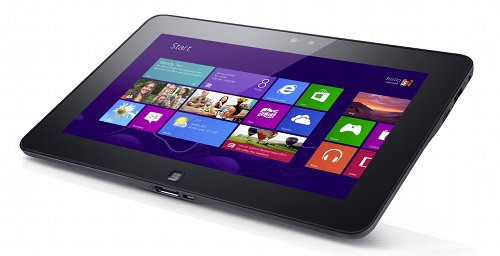
The next few months are going to be interesting for the world of mobile computing.
Take the smart phone market. Although Android-based phones have a 62.5% market share in the UK, it's Apple that makes most of the money. Some figures suggest the tech giant takes over 75% of the industry's total profits.
Dell shifts focus
It's all persuaded PC giant Dell to pull out of the smart phone business altogether. It thinks the best way to make an impact in the mobile computing world is to focus on Windows-based tablets.
It's a move that seems to make sense, as the firm's smart phones were generally overshadowed by manufacturers like Samsung, HTC and Apple.
Dell still makes a good proportion of the world's business computers though. If it can find a way to move those customers on to its tablets, maybe it could mount a challenge in 2013.
What about Microsoft?
Then there's Microsoft, of course, which hopes to have sown the seeds for its own mobile success in 2013.
Its latest operating system is Windows 8, and it's designed to provide a near-seamless computing experience across desktop and laptop computers, tablets and smart phones. If its Surface tablet can overcome some initial criticisms, it could make a splash.
What does all this mean for your business? Well, choosing a tablet isn't about to get easier. If anything, the raft of competing models will mean you have to spend a little longer figuring out which is right for you.
But at the same time, it's likely the increased competition will spark new ideas and innovation in the world of mobile computing. Flexible phones? Wearable computers? Watch this space...
Has Microsoft Surface won the laptop vs. tablet debate?
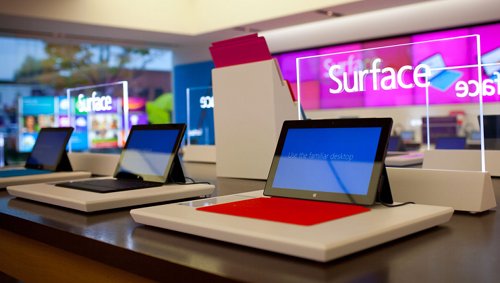
Small businesses traditionally stick with laptops, does Microsoft Surface mean they’ll now get the benefits of tablets too?
Tablets have really taken off in the past couple of years, with all of the major computer brands now in the market. Apple recently released its iPad Mini, and a number of other manufacturers have really upped their game.
Laptop or tablet?
The debate rages over whether these new tablets or traditional laptops are better for business. The real solution however, could lie with Microsoft’s new Surface: a tablet with laptop power and capabilities.
The overall consensus has been that tablets are best suited to displaying or digesting information, whereas laptops are better for business applications. The intrinsic tactility of a tablet suits it to presentation, while the superior power and setup of a laptop suits it to actual work.
Surface Pro then, the forthcoming model that runs the full version of Windows 8 (don't get it confused with the Surface RT, reviewed recently on this blog), is a hybrid of sorts.
It can be used as a sleek and attractive tablet, ideal for passing round a boardroom. But attach the keyboard and it should be a more effective workstation than any other tablet can hope to be.
Your business apps, anywhere
Fans of laptops will be pleased to see that Surface Pro will come equipped with an Intel i5 processor; a mid-level central processing unit that you’ll find in many modern laptops.
It will mean the Surface should be capable of handling a raft of traditional Windows software with ease, which is something most tablets can’t currently do. The clip-on keyboard is proving very popular, as it instantly turns the tablet into a workstation.
However, the real benefit of having a Windows operating system is, of course, that all your usual software should work on Surface Pro too.
Surface criticisms
Criticisms of the Surface are mainly aimed at its tablet aspects. For instance, reviews have suggested Surface is not as capable of displaying information attractively as rivals such as the iPad.
If you’re looking to impress clients, it seems that the offerings from Apple are a better choice. This is partly down to screen quality and Apple's slick interface.
The other criticism is the price. In particular, refurbished laptops offer a lot more power in terms of relative cost. If you’re looking to issue several members of staff with a computer, a laptop is by far the most cost effective option.
In conclusion, it appears the debate is far from over. Surface is a go-between, but it is not as good as either a tablet or a laptop for their respective specialities. The decision of which to buy probably relies on what you’re going to be using the computer for.
If you have a desktop and just need something to present information to customers on, then a tablet is best. If you need to be able to work on the go, then a laptop is probably essential. For something in between, Surface may do nicely.
Surface Pro will be available to buy from Microsoft from January. The price is expected to be around £700.
- Should you buy a Microsoft Surface?
- Windows 8 to spark tablet war?
- Now is when the tablet comes of age for business
Adam Hart-Davies is a computer enthusiast who writes on behalf of SCH Trade, who supply excellent value refurbished laptops.
Should you buy a Microsoft Surface?

Microsoft Surface, complete with Touch Cover
Should you buy a Microsoft Surface, the tablet computer Microsoft launched alongside Windows 8? Billed as an iPad beater, Surface is the tech giant's big bet to carve itself a space in the tablet market.
A month after the tablet hit the shelves, we've trawled the web to try and answer the question: should you buy a Microsoft Surface?
Buy a Microsoft SurfaceMicrosoft Surface is available direct from Microsoft. Most other online IT firms don't currently sell it. The entry-level model costs £399, but we'd recommend adding the Touch Cover for an extra £80. |
Design
Surface is boxier and slightly heavier than most of its rivals, but none the worse for it. Most reviews agree it has a distinctive design, with a clever kickstand that supports the tablet in portrait mode. PC Pro's Barry Collins explains:
"The mechanics of the kickstand are beautifully simple. The bottom half of the back of the tablet casing flicks out to create a stand, turning the device into a pseudo-laptop when used with one of the keyboards."
Ah yes, the keyboard. The Touch Cover is a thin screen cover for Surface that incorporates a touch-sensitive keyboard. It costs £100 if you buy it separately (and you'll almost certainly want one if you're going to buy a Microsoft Surface). There's also a thicker Type Cover (£110) which features a more traditional keyboard.
Review sourcesWe referred to these Microsoft Surface reviews when compiling this blog post: |
PC Advisor tried both:
"The Touch Cover is strange to use at first but is something you can get used to after a while. It's just 3mm thick and uses pressure-sensitive touch pads. The Touch Cover is fine for the odd bit of typing but anyone wanting to do any serious work will benefit no end by opting for the Type Cover."
In general, reviews praise the design and build quality of Surface, putting it up there with other leading tablets like Apple's iPad.
Software and apps
Surface runs a special version of Windows called Windows RT. This caused some consternation among reviewers, because it means Surface can't run the Windows software you already own.
Next year you'll be able to buy a Microsoft Surface that's thicker, heavier and able to run standard Windows apps. CNET UK's Andrew Hoyle explains:
"...you can only use software from the Marketplace app store, which is missing many big-name apps and is currently a low priority for most developers,"
Similarly, Information Week, complained about some obvious omissions:
"There are a lot of go-to apps that still aren't there. Microsoft's SkyDrive was the only cloud storage service available on day one, though DropBox was added shortly after. Others, like Google Drive and Carbonite, still aren't available. There's still no dedicated YouTube app. Social media staples like Twitter, Facebook and LinkedIn are absent..."
TechRadar agrees, in more scathing fashion:
"Windows RT won't run old PC programs [...] It has the potential to cause mass confusion and the power to sink Microsoft's figurehead before it's even taken off."
Having said that, Surface can run a special version of Microsoft Office, which is not available for non-Windows tablets.
Display and interace
On paper, Surface has a distinctly average screen. It's not as crisp as the iPad's Retina screen, nor as sharp as the displays found in many other tablets, like Google's Nexus.
However, as is often the case when it comes to displays, the screen's specifications don't tell the whole story. CNET found it well up to most jobs:
"I found it to be perfectly sharp enough for working on documents in Office, or indeed in Google Docs. Videos looked crisp, clear and bold, thanks to the display's good use of colour. It doesn't excel in any area, but it's a decent all-rounder."
Ease of use and performance
As we've mentioned before, Windows 8 has been designed for touch screens. And if you buy a Microsoft Surface, you'd expect it to make full use of these touch-enabled features. Wired found this aspect of the interface doesn't disappoint:
"It is delightfully gesture-friendly, and Microsoft has clearly spent much time thinking about and creating an entirely new interface."
However, Windows RT also incorporates elements from older versions. Most prominent is the old-skool Windows Desktop, which you have to use in order to run Microsoft Office. ZDNet found this is where the interface suffers:
"...any time you're forced to use the desktop interface (safely removing a USB stick or accessing Task Manager are other examples), you'll have an experience akin to finding a hand-crank starter on an otherwise sleek and modern-looking automobile"
Expert Reviews judged the tablet's speed and performance to be fine in general use, but discovered the Surface slows down when asked to perform more demanding tasks:
"In general use the tablet is as responsive as an iPad, with touch elements and web pages gliding around under your fingers [...] but the moment you try to do anything serious in Office things start to chug a little, while demanding 3D games such as Pinball FX 2 didn’t run as smoothly as we expected."
Verdict
Surface is a really interesting prospect. Microsoft should be commended for creating a tablet that does things a bit differently. The Touch Cover and kickstand are genuinely innovative and useful, and for day-to-day internet use you won't be disappointed if you buy a Microsoft Surface.
The ultimate vision of creating an environment in which software and files can move seamlessly from tablet to PC and back again is also attractive. But Microsoft isn't quite there with Windows RT. The mix of touch and traditional interface elements can be jarring, and there are notable omissions from available apps.
Those gaps are likely to get filled over time, and when Surface becomes available with the full version of Windows 8 next year you'll be able to run all your usual Windows software too.
If Microsoft manages to get that experience right, that's when Surface will become a compelling business tool. And that's why most businesses will probably want to buy a Microsoft Surface only once that new model becomes available.
You can buy a Microsoft Surface online now. Prices start from £399.
Panasonic CF-C2: a rugged laptop that can take a knock

If you're looking for a portable computer that can stand up to rougher treatment than your average wafer-thin ultrabook or tablet computer, and you're keen to move to Windows 8, Panasonic have a new combined laptop-tablet that'll be right up your street.
On paper, the company's new CF-C2 model looks pretty good. There's a mid-range Intel CPU, which is more than up to regular business jobs. The 12.5" screen has touch capabilities, so you can try out all the new Windows 8 features that are designed for touch screens. The claimed battery life of 11 hours is up there with other properly portable computers.
One notable feature is the way the screen can swivel, allowing you to use the CF-C2 either as a normal laptop, or folded flat as a tablet.
Other rugged laptopsPanasonic has long produced rugged laptops, from its flagship CF-31 (a scary £4,000) to the better-value CF-53 (£1,500). Dell also offers rugged laptops, including the Latitude E6420 XFR, possibly the toughest-looking laptop ever. |
But it's when you actually see this computer's rugged, don't-mess-with-me design that you realise it's a little out of the ordinary.
In fact, Panasonic has taken to calling it a 'toughbook'. Seems a fair description, even if it's not a category of computer we've encountered much before.
While it might look a little conspicuous in the boardroom, this rugged laptop is going to be at home out and about. It's been tested to withstand drops of up to 76cm, and has a water-resistant keyboard and strengthened glass on the screen.
For your average business, it's overkill. But if you work somewhere your laptop stands a good chance of taking the odd knock - on building sites, a factory shop floor or a warehouse, say - it could be a good buy.
It will go on sale in December. The price is likely to be a rather steep-sounding £1,700 or so. Get more information from the Panasonic website.
Trends, risks and benefits of BYOD
The ‘bring your own device’ (BYOD) trend, where employees use their own IT equipment for work, is here to stay. Embracing it is a big leap for a company, but many find there are significant advantages.
To help you understand the risks and opportunities of BYOD, Digium has produced this infographic.

Is your business embracing BYOD? Do you see it as an opportunity to work more effectively, or a threat to your control?
Windows 8 to spark tablet war?
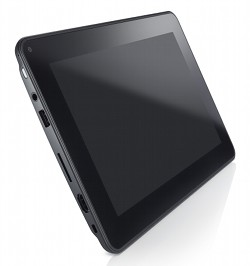 It's rather got lost in all the recent hype over iPhone 5, but Windows 8 - the next version of Microsoft's dominant operating system - will be available from 26 October.
It's rather got lost in all the recent hype over iPhone 5, but Windows 8 - the next version of Microsoft's dominant operating system - will be available from 26 October.
It can be a risky business being first to adopt a new Windows version. As with any major new software, there are usually a few bugs that need ironing out. Canny companies hold off upgrading until these teething problems are solved.
Windows on a tablet
Having said that, a big Windows 8 push is just round the corner. And it's not just from Microsoft. There are plenty of hardware companies hoping Windows 8's innovative new interface and touchscreen features will drive up their sales too.
What's more, Windows 8 is the first version of Windows to cater seriously for tablet computers. There will be lots of new features to take advantage of touchscreens, and so one exception to the 'don't be first to buy it' rule might be if you want a new tablet computer.
A new tablet from Dell
Take Dell. Anticipating a Windows 8 buzz, the hardware giant has just announced a new tablet that'll launch on the same day as Windows 8. It's the Latitude 10, and it promises to make the most of the tablet-focused features in Windows 8.
Done right, a Windows 8 tablet could be ideal for smaller companies. It should give them all the convenience of a tablet without requireing them to learn how to use lots of new software, or convert files between different formats.
Sure, our experiences with Windows 7 tablets have been underwhelming, but initial reports suggest Windows 8 will be an entirely different beast.
Security in a crowded market
Expect tablets like the Latitude 10 to be of particular interest to companies which handle lots of sensitive data. Dell's tablet puts a big emphasis on security, with support for two-factor authentication. This means you need something you know (like a password) and something you have (like your fingerprint or a smart card) to log in.
But it will be a crowded market. There's Apple's iPad (from £399), of couse. But recent months have seen Google (from £159) and Amazon (from £129) launch keenly-priced tablets. Even Microsoft will be launching a Windows 8 tablet. As Windows 8 draws closer, more Windows tablets will join the fray.
This all means now's a great time to keep an eye on the market, particularly if you like the idea of having a tablet but aren't quite convinced yet. Windows 8 will prompt new models, extra competition and - with luck - some aggressive pricing and innovative features.
Surface and Nexus: tech giants get into tablets
Any doubts about whether tablet computers have a future have faded. Apple's iPad might have seemed like a bit of a gamble when it was first announced, but it's been an enormous success.
For proof, you can check the company's impressive sales figures or simply count the number you spot next time you're on a long train journey.
You can also look at new tablet devices. Everyone wants a slice of the action, and recently we've seen two major announcements which could shake up the tablet world.
Microsoft Surface
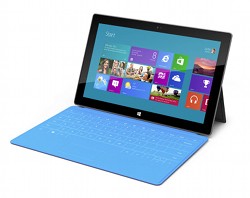 Microsoft revealed its new tablet computer, Surface, at a hyped-up media event in LA. Surface is a touch-screen tablet computer which Microsoft has designed and built itself. That's a real departure for a company which usually focuses on software.
Microsoft revealed its new tablet computer, Surface, at a hyped-up media event in LA. Surface is a touch-screen tablet computer which Microsoft has designed and built itself. That's a real departure for a company which usually focuses on software.
Surface will come in two flavours: one running a cut-down version of Microsoft Windows for mobile devices, the other running a full-blown version of Windows.
Initial reactions to Surface have been positive: the 11" device looks sleek and capable and has a retro rubber keyboard which doubles as a screen cover. But it won't be available for months, and as no details are available about battery life or price it's hard to judge it fairly.
Having said that, the next version of Windows is meant to be tablet friendly. If it really is (previous attempts have been less than impressive), Surface could be a real contender for business use, because you'll be able to run all your usual Windows apps.
Microsoft Surface is not yet available, and prices are still to be confirmed.
Google's Nexus 7
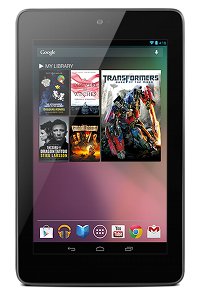 The other tech giant to jump on the tablet bandwagon this week was Google, which showed off its Nexus 7 tablet. With a smaller screen (7") and prices starting from £159, it's unlikely to be a direct competitor to Surface.
The other tech giant to jump on the tablet bandwagon this week was Google, which showed off its Nexus 7 tablet. With a smaller screen (7") and prices starting from £159, it's unlikely to be a direct competitor to Surface.
But this light and portable tablet may find business fans. At that sort of price, it's easy to envisage companies equipping sales and mobile staff with them as standard.
The most significant feature of the Nexus is its quad-core processor and 12-core graphics processing unit. In English, this means the Nexus 7 can crank up to run demanding apps. But at other times it can turn some of the cores off to extend battery life.
You can buy the Nexus 7 online from PC World Business, Currys, Comet, or direct from Google.
What's next for tablets?
These announcements show that it's an exciting time for tablet computing. If your company is thinking about investing in these new devices, your choice is increasing and stiff competition may drive prices down.
But Surface and Nexus also spell interesting times for business computing as a whole. Are tablet computers soon to become our mobile computing tool of choice? And if so, what does that mean for expensive, super-slim ultrabooks?
Other popular business tablets |
More popular content on tablets:
Two alternative ways to do tablet computing
It’s interesting to see how tablet computer manufacturers have lined up behind the indisputable industry leader, Apple. In some ways it feels like the iPad doesn’t have many head-on competitors.
Some tablet makers have tried to be a bit canny. Knowing Apple products aren’t cheap, they’ve aimed towards the budget end of the market – offering a tablet experience without the iPad’s price. Others have changed or added features – for instance, by making the display much smaller, including a detachable keyboard or adding an extra screen.
We’ve tested two tablets recently. The first is the Archos 101 G9. Available for a little over £200, this is a 10” tablet for the cost-conscious that fits squarely into the first category. The second we tried is the Fujitsu Stylistic Q550. At around £700 it ain’t cheap, but it’s one of the few tablets you’ll find running the full version of Windows 7.
Archos 101 G9: cheap but capable
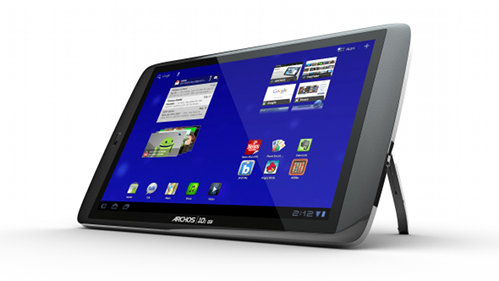
The Archos 101 G9 is no iPad in looks or build quality. It’s made of fairly flimsy plastic and feels cheap. But when you’re paying half the price of an iPad, you have to tolerate the odd compromise. And although it might be plasticky, the Archos case has some nice touches.
The screen is responsive to touches and swipes, there’s a built in slot to add an optional 3G data card (to get online via a mobile phone network), and the convenient fold-out stand props the tablet up at the right angle to read or watch. It sounds like a small thing but it makes a real difference to this tablet’s usefulness.
Sure, the charging cable is far too short (would it have killed them to make it just a bit longer?), but the battery lasts well and the screen is fairly crisp, if lacking in contrast. Maybe most importantly, this tablet has reasonable power. With a proper dual-core processor, it runs the latest version of Google’s Android operating system, allowing you to access loads of different apps and they’ll run at a decent speed.
We did run into some quirks with the standard web browser. Tapping links didn’t always seem to register first time and there were a few stutters and judders that might put you off if you’re used to a smooth iPad.
In all, this is a capable tablet for the money. Although its features are geared more towards home than business users (Archos bill it as an ‘amazing multimedia’ machine for photos, videos and music), there’s no reason you can't use it for email, documents and more.
Fujitsu Stylistic Q550
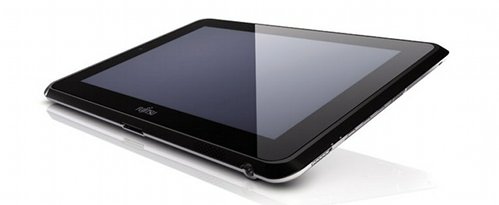
Not to be confused with this Philadelphia soul group, and quite in contrast to the Archos, the Stylistic Q550 feels really solid. Fujitsu is clear that this tablet is for business users and has included a full-blown version of Windows 7, enabling you to run the exact same software as on any other Windows PC. That means no cut-down apps and no nightmares trying to view websites in an awkward mobile browser.
It also means the Fujitsu should easily integrate into your existing network without compromising security or compatibility. Further boosting its security credentials is built-in encryption and a fingerprint reader, although we’ve yet to come across anyone who actually uses the latter.
Other notable features include excellent connectivity (there’s USB, HDMI for an external display, an SD memory card slot and more), front and back cameras and a stylus, which is basically a pen you can ‘write’ on the bright, crisp screen with. This is attached to the tablet by a cord, but frustratingly there’s nowhere to tuck it when you’re not using it. It also requires an oddly-sized AAAA battery (no, that’s not a typo).
The stylus adds an interesting dimension. It’s fantastically helpful if you’re doing jobs that require pinpoint accuracy, like editing photos. But in other circumstances it doesn’t offer many advantages over your fingers. We can see how it’ll serve a niche market well. But for most people, the stylus will be superfluous.
More useful is wireless USB. Not yet available on many tablets, it lets you connect to compatible devices wirelessly. It’s ideal for giving presentations without having to plug anything in.
This tablet takes a while to start up but once it’s going performance is reasonable, especially as you’re running demanding Windows software. Strangely, there’s no sensor to rotate the display, so Fujitsu has included a button to do this manually. There’s also a button for classic Windows key combination ‘CTRL-ALT-DEL’, which hardly inspires confidence in the operating system’s stability.
Value for money trumps unnecessary features
It’s true these two tablets aren’t direct competitors, but while we warmed to the Archos for its excellent value for money, we found the Fujitsu harder to like. If you’re looking for a really portable Windows computer, you could add a dock, keyboard and display and it might do nicely. But as a tablet, it’s flawed: unless you really need the stylus or strong security tools, you’d be better off with an iPad.
Where to buy tablet computers |
More content on tablets:
iPads vs laptops: Apple to win?
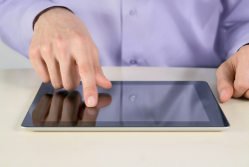 Over the years, new types of computer have come and gone. Remember the ultra-mobile PC? Or the Amstrad [email protected]? I wonder why Alan Sugar never mentions that on The Apprentice. And whatever happened to tablet computers with rotatable screens, built-in keyboards and a stylus for writing on the screen?
Over the years, new types of computer have come and gone. Remember the ultra-mobile PC? Or the Amstrad [email protected]? I wonder why Alan Sugar never mentions that on The Apprentice. And whatever happened to tablet computers with rotatable screens, built-in keyboards and a stylus for writing on the screen?
But every now and then, something comes along that does change things. And at the end of last year, a piece of news suggested that one new kind of computer is having a real impact – both at home and in the workplace.
The iPad sales success
Apple’s iPad reigns supreme in the UK tablet computer market. It accounts for almost three-quarters of all tablet sales. And perhaps most impressively, it turns out that Apple is selling more iPads than Dell is selling laptop computers.
Given that Dell is one of the world’s biggest computer manufacturers (the company claims it ships over 10,000 systems a day), that’s astonishing. And it strongly suggests that long-term, the iPad – plus other tablet computers, should anyone start buying them – could have a huge impact on what sort of computers we use and how we use them.
People are embracing the iPad enthusiastically, swapping full-spec laptops for the thin, light, super-easy-to-use Apple gadget. Who can blame them? No long waits while it starts up, no fiddly keys or buttons ... just a touchscreen anyone can use, plus thousands of apps.
It’s not a stretch to say that 2012 could see tablet computers establish themselves as the mobile computing tool of choice. Unless you need a full-size keyboard, it’s becoming more difficult to see what benefits are offered by traditional laptops for typical on-the-move tasks like checking email or reviewing documents.
Nobody wants a netbook any more
Just ask the companies which sell netbooks, the small, cheap, low-powered laptops that just a few years ago were poised to reshape the PC industry. Things don’t look great for them: sales have slumped 40%. Blame is being laid at the door of the iPad.
The argument stands up: to many people, netbooks are just compromised laptops. If you can’t type comfortably on the keyboard and you have to squint to see the screen, a tablet computer might well be a better option.
What’s more, machines like the iPad are developing fast. Will the combination of impressive hardware and versatile apps persuade more people to swap their netbook or laptop for a tablet?
Laptop makers certainly are worried. You can tell, because the big players are rushing to release ultrabooks, another type of computer which is like a netbook but thinner, more powerful and much more expensive.
These sleek machines have enough punch to replace your desktop computer, but are designed to start instantly and be small enough to take anywhere. They look great, they perform well and – although they can be expensive – they’re finding a spot in the market.
This time it’s the MacBook Air
But hold on – guess who makes the most successful ultrabook. Yep, that’s right: it’s Apple again, this time with the MacBook Air. This is the computer which pretty much defined what an ultrabook should be – and it certainly represents what other ultrabook manufacturers aspire to.
Put aside the ultrabook vs. netbooks vs. laptops vs. tablets debate. The real story might be Apple itself, and whether it can take a much bigger slice of the business IT market in 2012.
- Can you really use an Apple Mac for business?
- Should you bring your iPad to work?
- Are tablet computers right for your company?
This is a guest post from Integral IT, a Yorkshire IT support company.
HP TouchPad sale: is it worth buying an £89 tablet computer?
 Word has reached us (thanks PC Pro) that Dixons will slash the price of HP's TouchPad Tablet PCs from 6pm today. According to the company's Mark Webb, you'll be able to pick up the 16GB version of the tablet computer for £89. The larger 32GB version will cost £115.
Word has reached us (thanks PC Pro) that Dixons will slash the price of HP's TouchPad Tablet PCs from 6pm today. According to the company's Mark Webb, you'll be able to pick up the 16GB version of the tablet computer for £89. The larger 32GB version will cost £115.
Product discontinued
The reason for the huge reduction? HP announced last week that it's pulling out of the tablet computer business, triggering a fire sale in the US that now looks like it'll be mirrored over here.
With these products previously retailing for £400 or more, and competitors like the iPad 2 similarly expensive, this does look like a real bargain. But even if you can get on the Dixons site to buy one (we're predicting enormous demand for the limited supply), is it worth it?
Limited apps, sluggish performance
You'll be paying around £100 for a tablet PC with no real app 'ecosystem' (so there's not much you can install onto it). Still, you'll be able to browse websites, watch video and use maps. And that might be enough to persuade many people to part with the cash. We're seriously considering it.
But do be aware of the limitations if you're tempted. Going by this review you can expect sluggish performance compared to an iPad 2, limited (or non-existent) abilities to load and edit Microsoft Office documents, and a unit that's less-pleasing to hold than many of its competitors. There's another review here to help you make a snap decision.
The flip side
Despite these drawbacks, a bargain HP TouchPad might still be worthy of consideration if you want to dip a toe in the world of tablet computing. HP is promising to provide support for the tablet, and expects customers to continue to receive updates and enhancements.
Don't expect the TouchPad to match an iPad, In fact, to be safe, see it as a web browser that can play video and show you maps, and not much else. But even with those relatively low expectations, this is one £100 tablet that could be a bit of a bargain.
You should be able to buy online from 6pm today at Dixons, PC World and Currys. Good luck!
Sure, your iPad is cool. But my netbook is better for business.

Add a keyboard and perhaps your iPad will be more useful. (Photo: Stefan Evertz)
It's hard to deny that the iPad 2 is cool. And if you weren't one of the crazy enthusiastic punters who queued up last week to get one, demand for Apple's new gadget means that if you want one, you're probably in for a bit for of a wait.
Maybe we should all use that time to step back and ask: is the iPad actually much use for business? And, for that matter, do other tablet and slate-type devices like Motorola's Xoom or Samsung's Galaxy Tab really deserve a place in your company?
Limited business applications
I don't own an iPad, nor any other kind of slate or tablet computer. A few years back, I used Toshiba's M200 Tablet PC as my main work computer, but although it was one of the best laptops I've ever had, I rarely used the tablet features (you could fold the screen over and use a pen to write on it).
Sure, there's a big difference between Microsoft's clunky attempt to adapt Windows for a tablet device - which was running on that computer - and Apple's super-slick interface. But ease-of-use alone is not enough to establish the iPad as a must-have business tool.
The business applications I've seen for the iPad so far have been limited. I've spotted people at events using them to sign people up to mailing lists. And I can see how they'd be useful for people who need access to information but are on their feet all day. iPads could replace clipboards in warehouses, dentists' surgeries and the like.
My netbook is better and cheaper
But what about the sort of repetitive business tasks you take care of every day? Writing letters and emails. Running accounting software. Accessing your customer relationship management system.
For these sorts of jobs, my distinctly un-glamorous netbook (a cheap, cut-down laptop) is far better than an iPad. Here's why:
- It's not as small or as light as an iPad, but it's small and light enough to go everywhere with me.
- It has a proper keyboard, so I can type documents accurately and quickly.
- It has USB ports and doesn't need extra adaptors to plug into a proper monitor, so it's easier to use with my existing IT kit.
- The battery lasts about eight hours. That's probably less than an iPad, but plenty for a day on the road.
- There's plenty of space for my files and I can switch from web browser to spreadsheet to whatever in seconds.
In fact, the more I think about it, the more it seems that the only advantage that slate devices offer is that you can use them standing up. If there's a desk or space where I can sit and type at my netbook, it's the better option. Although, to be fair, I won't look as cool.
What's more, a netbook like mine is cheap. Figure £250 or so for a very capable netbook, compared to £399 for the entry level iPad.
Is it just me who can't see the point of the iPad for businesses? Do you use one in your company? Leave a comment and let me know.



